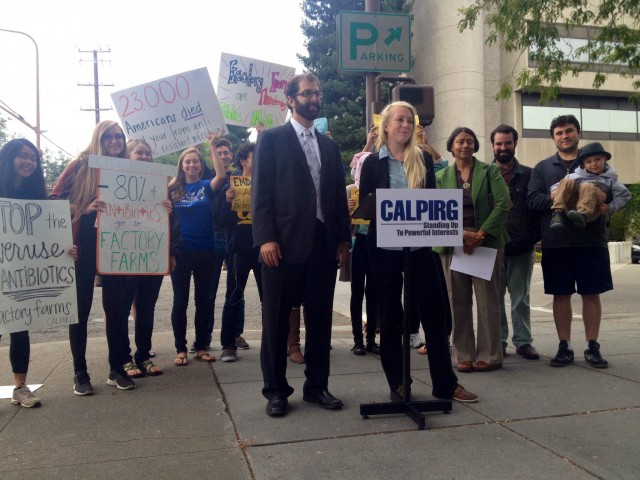Allayaud said there was a competing bill that would have closed those loopholes. AB 1437, sponsored by San Francisco Assemblyman Kevin Mullin, was scheduled to go in front of the assembly agricultural committee in May. That bill was largely based on federal legislation, the Preventive Antibiotic Resistance Act, backed by California Sen. Diane Feinstein. Feinstein has long been an advocate for stiffening regulation of antibiotics used in livestock.
But, the Mullin bill faced withering criticism from industry lobbyists and skepticism from Ag Committee members. When it was apparent he didn’t have the votes, the freshman lawmaker withdrew the bill from consideration.
"Our feeling was, better to live another day, and pulling the bill left us in a better position to reintroduce this important piece of legislation in a future session,” said Mullin chief of staff Hugh Bower.
As in the early days of the debate around climate change, there is debate around how proactive lawmakers should be about worrisome, if somewhat inconclusive, science. Both the Centers for Disease Control and the World Health Organization say that overuse of antibiotics in livestock is contributing to the rise in so-called superbugs. Some 23,000 Americans die every year from resistant infections, with many more hospitalized.
The problem is that there is debate about how big a role the prolific use of antibiotics in animal husbandry plays in driving antibiotic resistance in people.
At a June hearing over the Hill bill, Assemblyman Bill Quirk, a former NASA climate change scientist, articulated some of that skepticism, saying of antibiotic use in animals, "We can’t show that this is the real problem.”
The tensest moment in the June hearing came after testimony from the Natural Resources Defense Council opposing the Hill bill. Sen. Hill responded, saying, “I appreciate the opposition’s medical opinions when antibiotics should or should not be used, but I don’t see a (veterinary degree) after their names or an MD. The FDA says that prevention can be considered a judicious use of antibiotics. Prophylactic antibiotics are often given to patients undergoing such procedures as gastrointestinal surgery, cardiac surgery, dental surgery I mean we have that, take that all the time."
In Washington, DC, I caught up with New York Congresswoman Louise Slaughter between votes on Capitol Hill. Slaughter is a 14-term veteran of Congress and a microbiologist. She began studying antibiotic resistance back in the 1950’s when she wrote her thesis on rising levels of resistance linked to the overuse of penicillin. Today she is the outspoken co-sponsor of Sen. Feinstein’s Preventive Antibiotic Resistance Act.
When I told her of Hill's comments, she bristled. “I would hope that a California legislature would have more sense than to recognize that if a doctor gives antibiotics to you for prevention for surgery, that’s different than feeding antibiotics to your child in their cereal everyday," Slaughter said.
Sen. Feinstein stayed away from the fray in Sacramento. In a statement she said she was in favor of change addressing the issue, “however incremental.” She did reiterate the seriousness of the problem saying the “overuse of antibiotics by farmers and ranchers contributes to antibiotic resistance in humans and is an important public health issue. I believe antibiotics should be used judiciously and only when necessary.”
